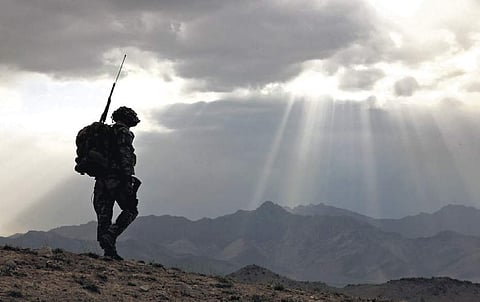

Following two humiliating wars with the Afghans, the first between 1839-1842 and the second 1878-1880, the British were pleased as punch to manage to get the Amir of Afghanistan, Abdur Rahman Khan, to sign on a document that was handed to him by Sir Mortimer Durand, a diplomat and a civil servant of the British Raj. This paper practically gifted much of southern Afghanistan to the British.
The fact that the document was in a language that the Amir did not understand or there were no witnesses to the signing of the document is only the beginning of the chequered legacy of the ‘cursed line’ drawn in the sand.
Running through the Pashtun tribal areas and also the Balochistan region, the Durand Line demarcates the international border between Pakistan and Afghanistan but remains largely unrecognised in Afghanistan.
Dogra’s meticulous research that puts together the story of the line that partitioned Afghanistan brings to life the story of what could probably rank amongst the greatest of the crimes committed by the British in the 19th century. There have been reams written on the Great Game but what makes Durand’s Curse unputdownable is the manner in which Dogra strings the narrative of how since the beginning of recorded history to the present Afghanistan has been ‘the chessboard of empires’.
Using previously available material and long-buried archives, Dogra’s unique narrative reveals how this region that was called ‘Sindhu’ because of the Indus River right from the time of the Persians and the Greeks, who called the region ‘Hindu’ and ‘Indu’ respectively, has fascinated and lured people.
The lucid writing merges legends and historical details. For example, when Alexander the Great received a letter from his mother taunting him for being stuck in Afghanistan for three years after capturing Anatolia, Mesopotamia and Persia in a year, he sent back a sack full of Afghan soil and told his mother to spread it and when Macedonian nobles walked over it they began to fight amongst themselves.
The British Army that accompanied Shah Shuja on the Afghan campaign had 20,000 troops, but over 38,000 camp followers to look after the men and the sheep and over 30,000 camels to carry the baggage. Of this, only one returned to narrate the blunder.
Dogra tells a riveting account of history that saw the participation of the British, the Russians, the French, the Americans and many more. He had previously penned one of the most respected books on the India-Pakistan relationships, Where Borders Bleed, and Durand’s Curse keeps up that legacy.
It’s intriguing how very early on Dogra emphasises on the moral responsibility of writers and historians to reflect the truth; something that is often the first victim of a historian’s fallacy. One can safely say that the narrative of Durand’s Curse is devoid of any presentism.